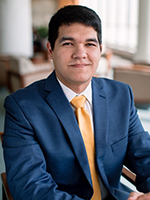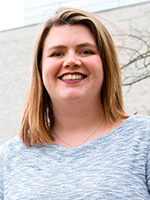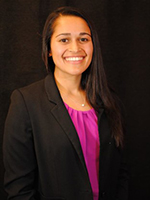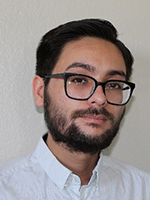ASPET is proud to announce the selection of nine awardees to participate in the 2021 Washington Fellows program. The mission of the Washington Fellows program is to enable developing and early career scientists interested in science policy to learn about and become more engaged in public policy issues. Due to restrictions on entry to the Capitol Hill complex as a result of COVID-19, this year’s program will be conducted virtually. As part of this year’s program, fellows will participate in a one-day mini-conference organized by ASPET, where they will receive training in advocacy and hear from guest speakers in the policy profession. Fellows will also attend meetings with their congressional representatives and staff so that they can advocate for increased funding for biomedical research and provide education on the necessity of animal research. Lastly, fellows will also receive comped registration to EB 2021, where they will have the opportunity to network with ASPET members and with fellows from previous years.
The nine fellows that comprise this year’s class were selected by ASPET’s Science Policy Committee. Get to know them below.
Sinibaldo R. Romero Arocha – University of Minnesota
 Sinibaldo was born and raised in Venezuela. He received his bachelor’s degree in Zoology and Biotechnology from North Dakota State University. As an undergraduate student, Sinibaldo developed his passion for biomedical research. After graduation, he pursued further research training at the Mayo Clinic. This experience inspired and cemented his vision for working at the intersection between research and medicine. He is currently an M.D./Ph.D. trainee at the University of Minnesota through the NIH Oxford-Cambridge Fellowship. His research interests are in Stem Cell Biology and Regenerative Medicine. In addition to research, Sinibaldo is passionate about providing care to vulnerable patient populations. For the past five years, he has volunteered as a Spanish interpreter in various clinics that offer free healthcare to uninsured patients in Minnesota. As an ASPET Washington Fellow, Mr. Romero Arocha aims to further his understanding of clinical trials and regulatory sciences. He ultimately hopes to develop the skillset and experience to advocate for biomedical research and providing safety nets for vulnerable patient populations.
Sinibaldo was born and raised in Venezuela. He received his bachelor’s degree in Zoology and Biotechnology from North Dakota State University. As an undergraduate student, Sinibaldo developed his passion for biomedical research. After graduation, he pursued further research training at the Mayo Clinic. This experience inspired and cemented his vision for working at the intersection between research and medicine. He is currently an M.D./Ph.D. trainee at the University of Minnesota through the NIH Oxford-Cambridge Fellowship. His research interests are in Stem Cell Biology and Regenerative Medicine. In addition to research, Sinibaldo is passionate about providing care to vulnerable patient populations. For the past five years, he has volunteered as a Spanish interpreter in various clinics that offer free healthcare to uninsured patients in Minnesota. As an ASPET Washington Fellow, Mr. Romero Arocha aims to further his understanding of clinical trials and regulatory sciences. He ultimately hopes to develop the skillset and experience to advocate for biomedical research and providing safety nets for vulnerable patient populations.
Anu Balogun – University of Pittsburgh
 Anu is originally a microbiologist, she earned her bachelor’s degree in Nigeria where she was born and raised. She also holds a Professional Science Master’s degree in Biotechnology from the University of South Florida. As part of her master’s thesis, she spent time investigating the deregulation of microRNA-29 family in melanoma at H.Lee Moffitt Cancer Center in Tampa, Florida. During this time, her training also covered topics related to technology and law which furthered her interest in science policy. Anu is currently a second year Ph.D. candidate at the University of Pittsburgh’s School of Medicine in the department of pathology. Her research revolves around the study of the porphyria which are rare disorders caused by deficiencies in heme biosynthesis pathway enzymes. In her work, she is assessing the mechanism by which inhibition of the Wnt/β-catenin signaling pathway protects from liver injury in a chemically induced mouse model of porphyria and whether pharmacological inhibition of β-catenin can prevent progression or provide protection in genetic mouse models of porphyria. In her spare time, she co-chairs the Biomedical Graduate Student Association’s Diversity & Inclusion committee. As an ASPET fellow, Anu hopes to understand the diplomatic aspect of influencing how politicians understand science and harness her ability to adequately utilize science as a strong evidence to support science policy enactment globally.
Anu is originally a microbiologist, she earned her bachelor’s degree in Nigeria where she was born and raised. She also holds a Professional Science Master’s degree in Biotechnology from the University of South Florida. As part of her master’s thesis, she spent time investigating the deregulation of microRNA-29 family in melanoma at H.Lee Moffitt Cancer Center in Tampa, Florida. During this time, her training also covered topics related to technology and law which furthered her interest in science policy. Anu is currently a second year Ph.D. candidate at the University of Pittsburgh’s School of Medicine in the department of pathology. Her research revolves around the study of the porphyria which are rare disorders caused by deficiencies in heme biosynthesis pathway enzymes. In her work, she is assessing the mechanism by which inhibition of the Wnt/β-catenin signaling pathway protects from liver injury in a chemically induced mouse model of porphyria and whether pharmacological inhibition of β-catenin can prevent progression or provide protection in genetic mouse models of porphyria. In her spare time, she co-chairs the Biomedical Graduate Student Association’s Diversity & Inclusion committee. As an ASPET fellow, Anu hopes to understand the diplomatic aspect of influencing how politicians understand science and harness her ability to adequately utilize science as a strong evidence to support science policy enactment globally.
Miriam Barnett – University of Rochester
 Miriam was born and raised in Buffalo, NY. She received a Bachelor of Science degree in chemistry at the State University of New York at Geneseo, where she first got involved in research her freshman year. She became interested in the emerging field of bioinformatics, and pursued a Master’s degree at the Rochester Institute of Technology. During her master’s work, Miriam had the opportunity to work at the United States Department of Agriculture in conjunction with her thesis project. Her passion for science persisted, leading her to a PhD program in pharmacology and physiology at the University of Rochester, where she is currently studying opioid receptor signaling in the lab of Dr. Jean Bidlack. Miriam was recognized as an ASPET Molecular Pharmacology Highlighted Trainee in October 2020 for her research work and has also been selected to be part of an NIH T32 fellowship during her time in the PhD program. While curiosity has driven her interests in science, personal circumstances have left her well acquainted with the struggles of patients with rare diseases. As an ASPET Washington Fellow, Miriam hopes to develop skills to apply her foundation of scientific research to advocate for patients with rare diseases in both research and policy settings.
Miriam was born and raised in Buffalo, NY. She received a Bachelor of Science degree in chemistry at the State University of New York at Geneseo, where she first got involved in research her freshman year. She became interested in the emerging field of bioinformatics, and pursued a Master’s degree at the Rochester Institute of Technology. During her master’s work, Miriam had the opportunity to work at the United States Department of Agriculture in conjunction with her thesis project. Her passion for science persisted, leading her to a PhD program in pharmacology and physiology at the University of Rochester, where she is currently studying opioid receptor signaling in the lab of Dr. Jean Bidlack. Miriam was recognized as an ASPET Molecular Pharmacology Highlighted Trainee in October 2020 for her research work and has also been selected to be part of an NIH T32 fellowship during her time in the PhD program. While curiosity has driven her interests in science, personal circumstances have left her well acquainted with the struggles of patients with rare diseases. As an ASPET Washington Fellow, Miriam hopes to develop skills to apply her foundation of scientific research to advocate for patients with rare diseases in both research and policy settings.
Kensey Bergdorf – Vanderbilt University
 Kensey is from Ripley, West Virginia. She received two undergraduate degrees from West Virginia University-a Bachelor of Science in immunology and medical microbiology and a Bachelor of Multidisciplinary Studies with emphases in biology, leadership studies, and political science. While at WVU, she gained research and scientific communications experience that led her to apply to graduate programs. Kensey is now pursuing a Ph.D. in pharmacology at Vanderbilt University. She is mentored by Drs. Vivian Weiss and Ethan Lee, with whom she studies the role of Wnt signaling in the development of aggressive thyroid tumors and the thyroid tumor microenvironment. As an ASPET fellow, Kensey hopes to develop the skills necessary to effectively advocate for science policy issues affecting Appalachia, including the opioid crisis, pollution of water supply, and access to high-speed internet.
Kensey is from Ripley, West Virginia. She received two undergraduate degrees from West Virginia University-a Bachelor of Science in immunology and medical microbiology and a Bachelor of Multidisciplinary Studies with emphases in biology, leadership studies, and political science. While at WVU, she gained research and scientific communications experience that led her to apply to graduate programs. Kensey is now pursuing a Ph.D. in pharmacology at Vanderbilt University. She is mentored by Drs. Vivian Weiss and Ethan Lee, with whom she studies the role of Wnt signaling in the development of aggressive thyroid tumors and the thyroid tumor microenvironment. As an ASPET fellow, Kensey hopes to develop the skills necessary to effectively advocate for science policy issues affecting Appalachia, including the opioid crisis, pollution of water supply, and access to high-speed internet.
Phoebe Dacha - Virginia Commonwealth University School of Medicine
 Dr. Dacha was born and raised in Nairobi, Kenya. She graduated with a Bachelor of Science degree in biology from Virginia Union University, where she graduated with honors. She also holds a Masters degree in Physiology from Virginia Commonwealth University School of Medicine, an MD degree from Drexel University College of Medicine, and an MBA from Drexel University Lebow College of Business. She completed clinical training at RCH/University of California Riverside Family Medicine program. During her graduate studies in Physiology, she examined the quantification and detection of important neuromodulator nitric oxide using fluorescent indicators.
Dr. Dacha was born and raised in Nairobi, Kenya. She graduated with a Bachelor of Science degree in biology from Virginia Union University, where she graduated with honors. She also holds a Masters degree in Physiology from Virginia Commonwealth University School of Medicine, an MD degree from Drexel University College of Medicine, and an MBA from Drexel University Lebow College of Business. She completed clinical training at RCH/University of California Riverside Family Medicine program. During her graduate studies in Physiology, she examined the quantification and detection of important neuromodulator nitric oxide using fluorescent indicators.
While in medical school, Dr. Dacha was selected as an Albert Schweitzer Fellow. For her fellowship, she worked with the underserved in Philadelphia, PA. Currently, Dr. Dacha is a postdoctoral fellow at Virginia Commonwealth University in the Department of Pharmacology and Toxicology under the mentorship of Dr. Hamid Akbarali. Dr. Dacha’s postdoctoral work involves examining the role of the gastrointestinal microbiome and development of tolerance as it related to opioid abuse. In her spare time, Dr. Dacha participates in overseas medical missions with Crossover Healthcare Ministry.
Dr. Dacha is motivated to understand how public policy decisions are made in Washington, D.C. and to learn how to advocate effectively on Capitol Hill, particularly as it pertains to funding for basic science and clinical research.
Victoria Leroy – University of Florida
 Victoria graduated with honors from Winthrop University in Rock Hill, SC with a bachelor’s degree in Biology and minor in Chemistry. After graduating, she worked as a research technician at Atrium Health’s McColl Lockwood Laboratory in Charlotte, NC conducting preclinical testing of gene therapies for muscular dystrophy. Her time in this lab sparked her interest in therapeutic development and inspired her to pursue a career in research. She is currently working toward her PhD in Biomedical Sciences in the department of Pharmacology and Therapeutics at the University of Florida. Working under the mentorship of Dr. Ashish Sharma, she is investigating the mechanisms of inflammation resolution in post-lung transplant injury to identify potential therapeutic targets. As an ASPET Washington Fellow, Victoria hopes to understand the integral role of scientists in advising evidenced-based policy writing and gain insight into the aspects of research that have the most impact on policy decision-making.
Victoria graduated with honors from Winthrop University in Rock Hill, SC with a bachelor’s degree in Biology and minor in Chemistry. After graduating, she worked as a research technician at Atrium Health’s McColl Lockwood Laboratory in Charlotte, NC conducting preclinical testing of gene therapies for muscular dystrophy. Her time in this lab sparked her interest in therapeutic development and inspired her to pursue a career in research. She is currently working toward her PhD in Biomedical Sciences in the department of Pharmacology and Therapeutics at the University of Florida. Working under the mentorship of Dr. Ashish Sharma, she is investigating the mechanisms of inflammation resolution in post-lung transplant injury to identify potential therapeutic targets. As an ASPET Washington Fellow, Victoria hopes to understand the integral role of scientists in advising evidenced-based policy writing and gain insight into the aspects of research that have the most impact on policy decision-making.
Mark Namba – Arizona State University
 Mark was born and raised in Florida and attended the University of Florida, where he earned a bachelor’s degree in Psychology. While an undergraduate at UF, Mark developed a passion for science while working under the mentorship of Drs. Lori Knackstedt and Marek Schwendt. Here, Mark assisted with studies examining the neurobiological and behavioral underpinnings of comorbid cocaine use disorders and posttraumatic stress disorder. After graduating from UF, Mark attended Arizona State University, where he earned a master’s degree in Psychology and is currently pursuing a PhD in Neuroscience. Under the joint mentorship of Drs. Janet Neisewander and Foster Olive, Mark is studying neuroimmune and behavioral mechanisms underlying the comorbidity of cocaine use disorders and HIV using preclinical rodent models. Specifically, Mark’s research focuses on how abstinence from chronic cocaine use may interact uniquely with HIV to promote neuroinflammation and increase drug-seeking behavior, which could have clinical implications for individuals living with HIV who are seeking treatment for substance abuse. Outside of the lab, Mark volunteers with a local harm reduction collective within the Phoenix area that provides syringe access, naloxone distribution, and many other harm reduction services. As an ASPET Washing Fellow, Mark hopes to gain valuable experience in public health policy and learn how to effectively advocate for continued funding of biomedical research as well as evidence-based drug policy.
Mark was born and raised in Florida and attended the University of Florida, where he earned a bachelor’s degree in Psychology. While an undergraduate at UF, Mark developed a passion for science while working under the mentorship of Drs. Lori Knackstedt and Marek Schwendt. Here, Mark assisted with studies examining the neurobiological and behavioral underpinnings of comorbid cocaine use disorders and posttraumatic stress disorder. After graduating from UF, Mark attended Arizona State University, where he earned a master’s degree in Psychology and is currently pursuing a PhD in Neuroscience. Under the joint mentorship of Drs. Janet Neisewander and Foster Olive, Mark is studying neuroimmune and behavioral mechanisms underlying the comorbidity of cocaine use disorders and HIV using preclinical rodent models. Specifically, Mark’s research focuses on how abstinence from chronic cocaine use may interact uniquely with HIV to promote neuroinflammation and increase drug-seeking behavior, which could have clinical implications for individuals living with HIV who are seeking treatment for substance abuse. Outside of the lab, Mark volunteers with a local harm reduction collective within the Phoenix area that provides syringe access, naloxone distribution, and many other harm reduction services. As an ASPET Washing Fellow, Mark hopes to gain valuable experience in public health policy and learn how to effectively advocate for continued funding of biomedical research as well as evidence-based drug policy.
Valeria Robleto – Medical College of Wisconsin
 Valeria was born and raised in Managua, Nicaragua. In 2014, she was awarded a Walton International Scholarship to attend the University of the Ozarks in Clarksville, AR, where she double majored in Chemistry and Biology. Currently, Valeria is pursuing her PhD in biochemistry at the Medical College of Wisconsin, where she is a member of the Marchese lab which studies signal transduction by G protein-coupled receptors (GPCRs). Her research is focused on the chemokine receptor CXCR4, which plays an important role in physiology and disease. Valeria’s career goals are to continue to study GPCR signaling as an independent investigator at a university that allows her to focus on teaching undergraduates while maintaining an active research program. Valeria cares deeply about science education and research advancement. As an ASPET fellow, she hopes she will be able to learn and practice how to effectively communicate with elected officials.
Valeria was born and raised in Managua, Nicaragua. In 2014, she was awarded a Walton International Scholarship to attend the University of the Ozarks in Clarksville, AR, where she double majored in Chemistry and Biology. Currently, Valeria is pursuing her PhD in biochemistry at the Medical College of Wisconsin, where she is a member of the Marchese lab which studies signal transduction by G protein-coupled receptors (GPCRs). Her research is focused on the chemokine receptor CXCR4, which plays an important role in physiology and disease. Valeria’s career goals are to continue to study GPCR signaling as an independent investigator at a university that allows her to focus on teaching undergraduates while maintaining an active research program. Valeria cares deeply about science education and research advancement. As an ASPET fellow, she hopes she will be able to learn and practice how to effectively communicate with elected officials.
Serena Scognamiglio – Georgetown University
 Born and raised in Naples, Italy, Serena received her Pharm.D. from the University of Naples - Federico II. During her PharmD, she had her first exposure to neurophysiology, and this led her to further inquire into the relationship between our brain and the effects of substance use on behavior. As part of the program requirements, Serena trained as a pharmacist during her fourth year of school, where she gained experience preparing and dispensing medications in conformity with the European Medicines Agency (EMA) regulations. Serena carried out her experimental thesis at the National Institute on Drug Abuse (NIDA) where she studied the interactions between microglia cells and neurons in the basal ganglia. Serena is currently a doctoral candidate in pharmacology and physiology at Georgetown University. Under the mentorship of Dr. Ken Kellar, she is investigating the dysfunction of neuronal pathways in the aged brain and the potential benefits of pharmacological interventions on cognition. As an ASPET fellow, Serena hopes to enhance her understanding of the legal and regulatory processes of drug policy and thus help lay the foundation for a post-doctoral position in pharmaceutical legislation.
Born and raised in Naples, Italy, Serena received her Pharm.D. from the University of Naples - Federico II. During her PharmD, she had her first exposure to neurophysiology, and this led her to further inquire into the relationship between our brain and the effects of substance use on behavior. As part of the program requirements, Serena trained as a pharmacist during her fourth year of school, where she gained experience preparing and dispensing medications in conformity with the European Medicines Agency (EMA) regulations. Serena carried out her experimental thesis at the National Institute on Drug Abuse (NIDA) where she studied the interactions between microglia cells and neurons in the basal ganglia. Serena is currently a doctoral candidate in pharmacology and physiology at Georgetown University. Under the mentorship of Dr. Ken Kellar, she is investigating the dysfunction of neuronal pathways in the aged brain and the potential benefits of pharmacological interventions on cognition. As an ASPET fellow, Serena hopes to enhance her understanding of the legal and regulatory processes of drug policy and thus help lay the foundation for a post-doctoral position in pharmaceutical legislation.